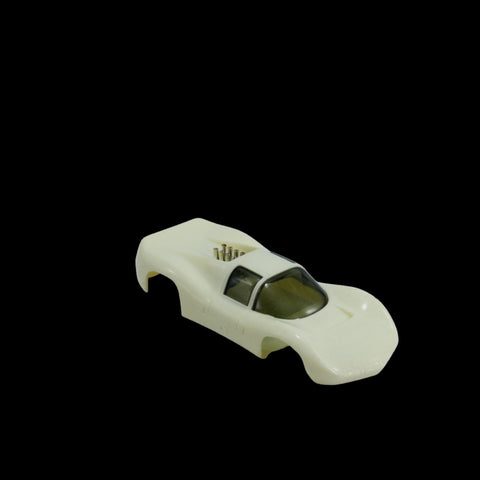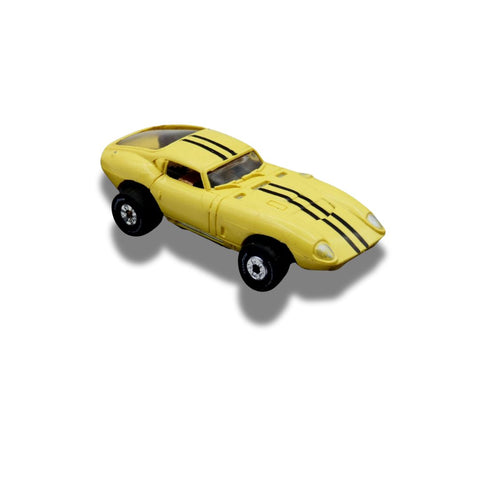
Unlock the Thrill of Vintage Slot Car Racing from the 1950s and 1960s!
The history of vintage slot cars dates back to the early 20th century. The first commercially available slot car sets were produced in the United States in the early 1910s. They were initially made of tinplate and had very basic designs. In the 1930s, the first commercial raceway opened in England, and the hobby began to gain popularity. In the 1950s and 1960s, the hobby saw a major boom, with advancements in technology leading to more realistic and detailed cars
In the early 1960s, commercial slot car racing tracks began to appear in hobby shops and dedicated racing centers across the United States. These venues quickly became hubs for communities of racers who would gather to compete, share tips, and marvel at the latest advancements in slot car technology. The cars themselves evolved rapidly, with hobbyists and manufacturers alike experimenting with different materials, designs, and engineering techniques to improve speed and performance.
One of the most iconic periods in slot car racing history was the mid-1960s, often referred to as the "Golden Age" of the hobby. During this time, major toy companies like Aurora, Revell, and Tyco entered the market, producing highly detailed and realistic slot cars that captivated the imagination of young and old alike. National and regional racing leagues were established, and large-scale competitions drew participants and spectators from all over the country.
However, by the late 1960s and early 1970s, the popularity of slot car racing began to wane, partially due to the rise of other forms of entertainment and changes in consumer interests. Despite this decline, the passion for slot car racing never entirely disappeared. Enthusiasts continued to maintain tracks, organize races, and collect vintage cars, keeping the spirit of the hobby alive.
In recent years, there has been a resurgence of interest in slot car racing, fueled by nostalgia and the desire for hands-on, interactive experiences in an increasingly digital world. Modern slot car racing incorporates advanced technology, including digital controls and wireless connectivity, enhancing the racing experience while preserving the classic appeal of this beloved pastime.
Today, slot car racing remains a cherished hobby for many and a testament to the enduring appeal of speed, competition, and the joy of miniature motorsport.
Aurora slot car history is a fascinating journey through the evolution of a beloved hobby that has captivated enthusiasts for generations. Aurora Plastics Corporation, originally founded in 1950, became a household name in the 1960s and 1970s with its innovative slot car racing sets. These miniature marvels allowed hobbyists to recreate the thrill of auto racing in their own homes, with intricate tracks and detailed cars that sparked the imagination.
Aurora's most iconic contribution to the slot car world was the Model Motoring series, introduced in 1960. These sets featured HO scale cars and tracks, which were smaller and more affordable than the larger 1:32 and 1:24 scale offerings from other manufacturers. This made slot car racing accessible to a wider audience and helped to fuel a growing interest in the hobby.
Throughout the 1960s, Aurora continued to innovate, introducing the revolutionary Thunderjet 500 in 1963. This new chassis design provided better handling and speed, making for more exciting races. The company's dedication to detail and quality earned it a loyal following, and Aurora slot cars became a staple in homes across America.
The 1970s saw further advancements with the introduction of the AFX (Aurora Factory Experimentals) series, which featured even more realistic and high-performance cars. However, as video games and other forms of entertainment began to emerge, the popularity of slot cars waned. Despite this, Aurora's impact on the hobby remains undeniable, and vintage Aurora slot cars are still highly sought after by collectors today.
The legacy of Aurora slot cars lives on, not only in the collections of enthusiasts but also in the continued interest in slot car racing as a hobby. The excitement of controlling a speeding car around a twisting track, the thrill of competition, and the joy of craftsmanship are just as present today as they were during Aurora's heyday.
Aurora’s slot car production ceased in 1983 due to financial difficulties. The AFX brand was later acquired by Tomy Kogyo Ltd. of Japan in 1984. Aurora’s slot cars remain iconic, with many collectors and enthusiasts still seeking out vintage models. The brand’s legacy extends beyond its products, as it played a significant role in defining the toy purchasing habits of two generations.
Eldon Industries was founded in 1949 by Erwin L. Dauner in Milwaukee, Wisconsin. The company initially focused on producing toy trains but later expanded into other areas, including slot cars. Eldon entered the slot car market in the early 1960s, during the height of the slot car racing craze.
Eldon's first slot car sets were released in 1963 and were known for their innovative designs and high-quality components.

The company produced a variety of track layouts and cars, often featuring unique and colorful designs that set them apart from their competitors. One of Eldon's most popular slot car sets was the "Turbo 500," which featured a high-performance car with a powerful motor. Another notable release was the "Eldon Challenger," a set that included a track layout with a challenging banked curve.
Throughout the 1960s and early 1970s, Eldon continued to produce and sell slot car sets, enjoying considerable success in the United States and abroad. However, as the popularity of slot car racing began to wane in the mid-1970s, Eldon faced declining sales and increased competition from other toy manufacturers.
In the late 1970s, Eldon Industries was acquired by the Kusan Toy Company, which continued to produce slot car sets under the Eldon brand for a short time. Eventually, the Eldon slot car line was discontinued, and the company focused on other toy products. Despite the decline of the Eldon slot car brand, the company's contributions to the hobby are still recognized and appreciated by slot car enthusiasts and collectors today.
Strombecker slot car history is deeply rooted in the world of model racing, dating back to the mid-20th century. Founded by J. Louis Strom in 1945, Strombecker initially focused on producing plastic toys and model kits. However, it was in the 1960s that the company truly made its mark with the introduction of their slot car racing sets.
These sets quickly gained popularity among hobbyists and young racing enthusiasts. Known for their detailed and durable designs, Strombecker slot cars provided an exciting and dynamic experience, allowing users to recreate the thrills of real-life racing on a miniature scale. The company's innovative approach included a variety of track layouts, accessories, and car models, which kept the hobby fresh and engaging. Over the years, Strombecker's commitment to quality and authenticity helped cement its reputation in the slot car racing community.
Their products became a staple in many households, fostering a sense of camaraderie and competition among family members and friends. Even today, vintage Strombecker slot cars and tracks are cherished by collectors, serving as nostalgic reminders of a golden era in model racing.
As the slot car racing hobby continues to evolve, the legacy of Strombecker lives on, inspiring new generations of enthusiasts to explore the exciting world of miniature motorsports.
Revell slot cars were produced by the Revell Company, which was founded in 1945 by Lewis H. Glaser. The company initially focused on producing scale model airplane kits but expanded into the slot car market in the early 1960s to capitalize on the growing popularity of the hobby.

Revell's entry into the slot car market was marked by the introduction of their "Highway Pioneers" line in 1963. These cars were known for their detailed bodies, innovative designs, and performance on the track. Revell produced a variety of slot car models, including 1/32 and 1/24 scale cars, with themes ranging from sports cars to drag racers and funny cars. One of the most notable Revell slot car models was the "Chaparral," a 1/32 scale replica of the Chaparral sports car. The Chaparral was known for its sleek design, powerful motor, and excellent handling, making it a favorite among slot car enthusiasts.
Throughout the 1960s and 1970s, Revell continued to produce high-quality slot cars, competing with other manufacturers like Cox, Aurora, and Monogram. However, by the 1980s, the popularity of slot cars had begun to decline, and Revell shifted its focus back to producing scale model kits, particularly airplanes and cars.
Today, Revell slot cars are highly sought-after by collectors and hobbyists who appreciate the company's attention to detail and quality craftsmanship. The legacy of Revell slot cars continues to inspire a new generation of enthusiasts who enjoy the thrill of racing these vintage miniature cars on custom-built tracks.
Cox slot car history is a fascinating journey through the evolution of miniature racing. The story begins in the mid-20th century, when slot car racing gained immense popularity as both a hobby and a competitive sport. One of the pivotal figures in this history is L.M. Cox, who founded the Cox Manufacturing Company in the 1940s. Initially, the company focused on producing model airplanes, but it soon diversified into the world of slot cars.
Cox slot cars quickly became renowned for their high-quality craftsmanship and innovative designs. By the 1960s, Cox had established itself as a leader in the slot car industry, producing a wide range of models that captured the imaginations of racing enthusiasts of all ages. The cars were meticulously designed to replicate real-life vehicles, complete with intricate details and powerful motors that ensured thrilling races on the track.
The 1960s and 1970s were the golden years for Cox slot cars, with elaborate racing sets and accessories that allowed hobbyists to create their own custom tracks. Competitions and club events became widespread, turning slot car racing into a vibrant community activity. Despite facing competition from other manufacturers, Cox maintained its reputation for excellence through continuous innovation and a commitment to quality.
Even today, vintage Cox slot cars are highly sought after by collectors and enthusiasts, cherished for their historical significance and nostalgic value. The legacy of Cox slot cars endures, a testament to the enduring appeal of this miniature motorsport and the ingenuity of a company that helped shape its history.
So, dust off those old tracks, give your cherished cars a tune-up, and relive the golden age of slot car racing. Whether you're competing in a heated tournament or simply enjoying a leisurely race with friends and family, the thrill of vintage slot car racing is a timeless adventure that continues to inspire and entertain.

